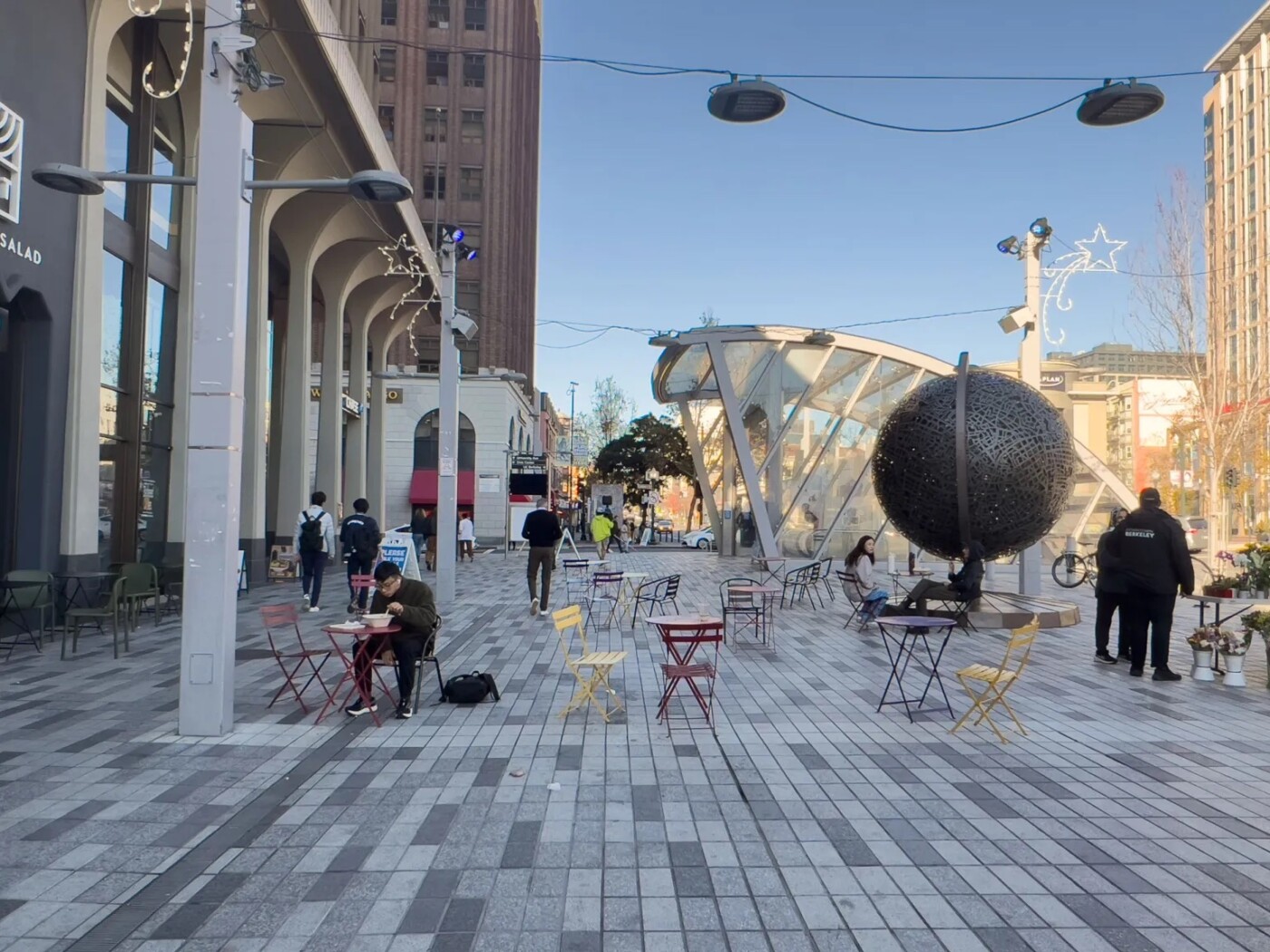AFTER COVID-19 EMPTIED restaurants and theaters in California’s city centers and businesses adapted to allow staff to work from home, downtowns never returned to their pre-pandemic vibrance.
On a recent Wednesday, Democratic state Assemblymembers Matt Haney of San Francisco and Buffy Wicks of Oakland, joined city leaders in a walking tour of downtown Berkeley. It was the eighth on a multi-city tour they took as members of the Assembly Select Committee on Downtown Recovery, which was established by the Legislature in February. Their goal was to learn from local business owners, residents, art organizations and developers about the challenges they face and determine how to design policies that bring back bustling downtowns.
“Everyone is dealing with some level of increased homelessness and decreased levels of public safety, and there is a general perception of not wanting to come downtown,” said Annie Keys, spokesperson for Haney. “But we’ve heard that nightlife has rebounded way faster than the 9 to 5 business. In San Francisco, in Sacramento, after work, 6 to 10 p.m. business is exceeding pre-pandemic levels. But the 9 a.m. to 5 p.m. business, at least in Sacramento, is looking at 40% of what it used to be.”

Many of California’s downtowns were built with little housing in their commercial districts, forcing the local economies to depend on daily commuters. That is why residential cities elsewhere like New York City are back to near pre-pandemic function, while California’s are struggling. The crisis has been further compounded by skyrocketing rents, growing homelessness, and the opioid crisis.
The arts are falling apart
The challenges facing downtown Berkeley are particularly hitting the arts and cultural institutions. The Berkeley Repertory Theatre and other arts organizations have seen significant declines in ticket sales and funding since to the pandemic, forcing them to cut staff and programming.
Clayton Shelvin, manager of the Freight & Salvage performance venue, said they are trying to diversify their offerings to reach new audiences.

“We’ve been doing music since the ’60s, and so now we have comedy and it’s great. It’s helping to expand our audiences, but it’s hard. Our venue is not set up to do anything else. We’re trying to figure out that piece,” Shelvin said.
Developers have put several major housing projects on hold due to declining rents and rising construction costs, leading to high vacancy rates which impacts local retail occupancy. John Caner, CEO of the Downtown Berkeley Association, said about 2,500 new housing units are on hold. The DBA is a nonprofit funded by downtown property owners and other sources that works to support the city center through programs like providing downtown ambassadors along Shattuck Avenue.
As neighboring cities like San Francisco and Emeryville have removed encampments, Berkeley has seen a significant increase in its homeless population.
“It’s probably because we do a lot of homeless outreach, other people have moved to town temporarily as they shut down some of the encampments in Oakland and Richmond,” Caner said. “We went from a low of 40 in June and we’re now at 104. It’s really discouraging.”

City officials are working with the DBA to provide more shelter and services, but face challenges with limited resources and legal constraints. The city is just starting to work with Gov. Gavin Newsom’s CARE Court, which allows social services to intervene and provide mental health services to certain people struggling with housing.
They also mentioned some successes with the state’s Homekey program for transitional housing with services.
The ‘dark side’ of public safety
Public safety remains a major concern among local business owners like Simone Arpaio, owner of Almare Gelato near the Downtown Berkeley BART station.
“We’ve been here for 16 years, and we’ve seen things that you only see in movies,” said Arpaio.
“I come here every morning, and I see the effort that everybody puts into making this place beautiful. They spent $18 million to change the pavement and everything. It’s a fantastic place. But there is a dark side that I would like for you to see. One of my employees has been raped and almost killed in the shop while working. My employees are harassed. We have people that cannot work here past 5 p.m. because their parents do not allow it.”
Arpaio said that when cops are standing around, the problems are gone, but he also feels there is a lack of enforcement and services.

“The DA does not put people in jail or does not do anything to people who steal and make assaults. The second thing is there is a huge mental health challenge. They are suffering. They are in need. They are in a condition that is inhumane, and nothing is done to help them.
“People are around for years around here. There’s a guy who has been here for two years. He’s probably 22, 23. And he was a classmate to one of our employees. And now he lives in the street. And I’ve never seen any help for him. I’m not saying that people are not trying. It’s a big deal, but it is not enough.”
The post Bringing back downtowns: Local leaders seek ways to restore their pre-pandemic vibrancy appeared first on Local News Matters.
